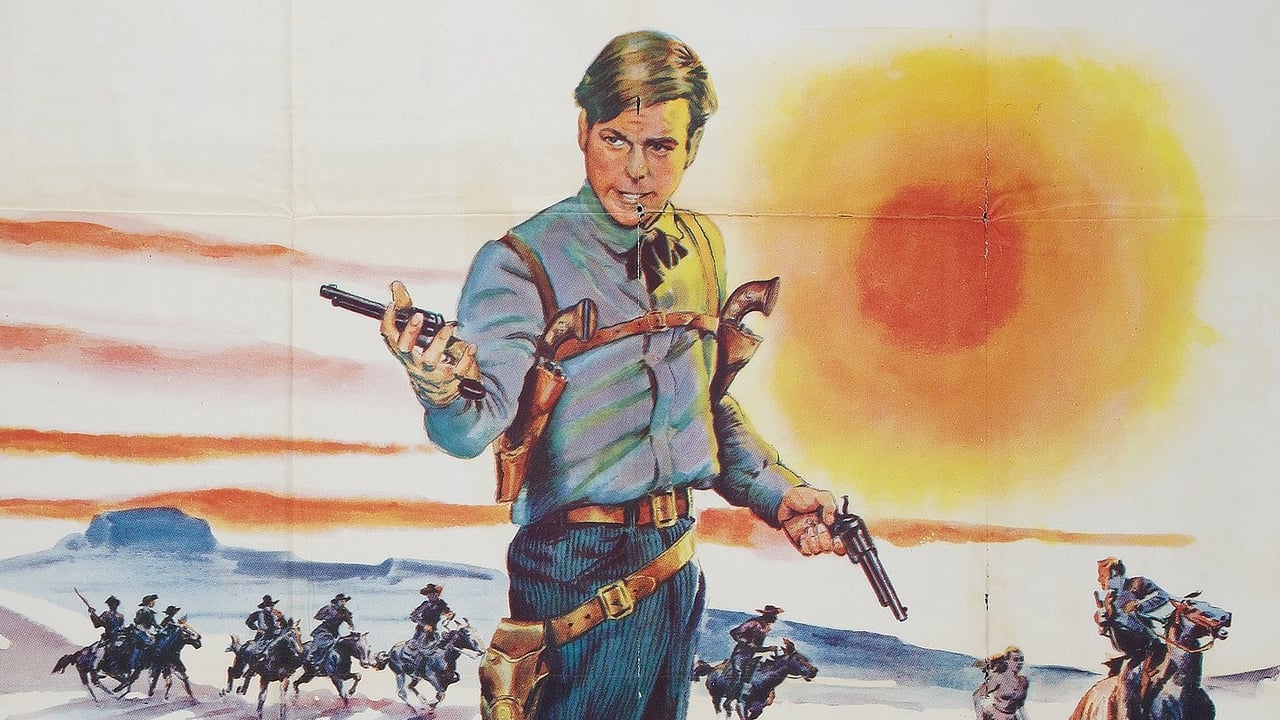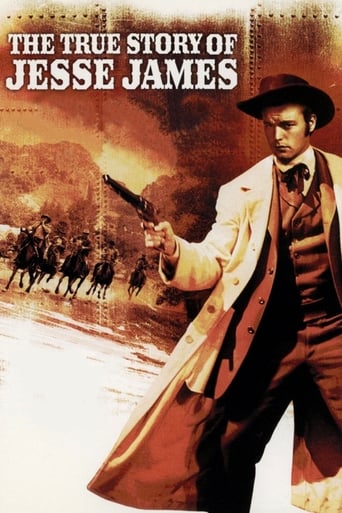

Copyright 1957 by 20th Century-Fox Film Corp. New York opening at the Globe: 22 March 1957. U.S. release: February 1957. U.K. release: 20 May 1957. Australian release: 18 April 1957. 8,257 feet. 92 minutes. U.K. release title: "The JAMES BROTHERS".SYNOPSIS: At the end of the Civil War, two brothers form a band of outlaws. But one of the brothers, Jesse, falls in love and decides to settle down in a town where no-one knows his real identity.COMMENT: The script: Although the credit titles make no mention of the fact, what we have here is not so much the "true story" of the James boys, but yet another variation — wearisomely muddled, clumsily constructed and one-dimensionally characterized — of Alfred Noyes' famous poem, "The Highwayman". I don't mind the screenwriter using Noyes as his anonymous source, so long as keeps the story moving as smoothly and rapidly as Noyes does, with plenty of narrative suspense and character conflict, heightened by just the right balance between atmospheric setting and intriguingly realistic background details. Unfortunately, Mr. Newman is a poor hand at all of these vital requirements.The acting: Admittedly, the script is no great shakes, but a good actor won't throw in the towel, no matter how inferior his material. A good actor will try to make something of it. Unfortunately, only one of the principals has made that attempt and she way overdoes it. Thank you, Agnes Moorehead. As for stolid Robert Wagner and equally juvenile Jeffrey Hunter, the most that can be said is that they seem to know their lines.The directing: Mr. Ray has stated, "I was not interested in "The True Story of Jesse James." Thanks, Nick, neither are we.P.S. The original Jesse James was Fox's biggest money-maker for 1939. Tyrone Power was Jesse, Henry Fonda played Frank, Nancy Kelly did Zee, under the direction of Henry King.OTHER VIEWS: After an exciting pre-credit sequence showing a raid on a small Western bank and a man-hunt through a forest, the remainder of "The James Brothers" fails to sustain the promise and vitality of this beginning... The familiar saga seems to have aroused little real interest in its director. — Monthly Film Bulletin.
... View MoreAbout the only thing I can say about The True Story Of Jesse James is that it's invested with a little less star glamor than the 1939 version with Tyrone Power and Henry Fonda as the James Brothers. Here Jesse and Frank are played by Robert Wagner and Jeffrey Hunter with a bit more of a realistic style rather than it being substantially true.Otherwise a lot of the same ground covered in flashbacks rather than a straight narrative is used. In fact Nunnally Johnson who wrote the 1939 screenplay for 20th Century Fox is given a screen credit here. The same theme is used here, Jesse might have turned outlaw for good and sufficient reason, but was getting a real taste for it by the time the Ford Brothers did him in.There is a harbinger of the Oscar nominated performance that Casey Affleck gave a few years ago in the most recent Jesse James film in Carl Thayler's brief appearance as Bob Ford. Thayler hints at what Affleck spent a whole film doing, showing that Ford was a mixed up kid who thought he would gain public approval shooting down a notorious outlaw. However a sadly neglected Jesse James film was done in the Nineties by Rob Lowe as Jesse.For better or worse many consider Jesse James as the last Confederate out there when he died in 1881. He certainly was a hero to many of the defeated Confederates doing what he did to the banks and railroads who were controlling a lot of the agrarian south and west.Not true, but The True Story Of Jesse James is a passable retelling of the events that made him the legend he became.
... View MoreFox's "The True Story Of Jesse James" (1957) is a remarkably poor widescreen remake of their prestigious 1939 Tyrone Power/Henry Fonda classic "Jesse James". I'm not sure where the fault lies but the casting in this version of the two central characters, the uneven direction of Nicholas Ray and the ham-fisted screenplay must surely have something to do with it.In the late thirties and forties Tyrone Power was Fox's top leading man but in the fifties his star began to wane and studio head Darryl Zanuck started to groom newcomer Robert Wagner to take his place. This was a major error on Zanuck's part as Wagner proved to be a less than a suitable replacement. With the possible exceptions of "Broken Lance" (1954) and "Between Heaven & Hell" (1956) it is hard to think of Wagner distinguishing himself in anything! Also, Jeffrey Hunter was nothing more than a Fox contract player before being assigned to play Frank James to Wagner's Jesse in "The True Story Of Jesse James". Borrowed from the studio the previous year this actor's one distinguishing mark was his excellent and revealing performance in John Ford's classic "The Searchers". But his playing here, along with Wagner as the second half of the James Brothers, is nothing short of boring. Neither player bring any personality or colour to their respective roles. They totally miss the mark, lacking the charisma and appeal so vividly displayed by Power and Fonda in the original. The movie is also marred by too many flashbacks and with the all over the place screenplay Wagner, as the Robin Hood of the American west, comes across as a charmless introverted twit that you can feel no empathy for whatsoever. The supporting cast are hardly worth mentioning but it is a shame to see such a great actress as Agnes Moorhead barely getting a look in as Ma James.The best aspects of this uninvolving so-so western is the wonderful Cinemascope/Colour cinematography by the great Joe McDonald and the excellent music score by the underrated and little known composer Leigh Harline!
... View MoreThere's not a big difference between the heroes of "Rebel without a cause" and the James bros.All are immature young people ,taking a rebel stand against the establishment (the well meaning society for Dean,Wood ,Mineo and their pals,the Yankees for these western Robin Hoods) .If the second movie is not as successful as the 1955 work (and as Ray's other "westerns " "Johnny Guitar" and "Run for cover" ) it's because the actors,with the staggering exception of Wellesian actress Agnes Moorehead,do not have great screen presence (Robert Wagner will improve with age).This is a western "a la "Citizen Kane" ,using now dying Moorehead's memories,now Lange's regrets ,now Frank's remembering what went wrong. In the poems she wrote ,Bonnie Parker alluded to the James brothers and it's obvious that Arthur Penn was certainly influenced by Ray when he directed his "Bonnie and Clyde" .(Jess's desire to have a home and to live in peace with his wife is also Clyde's)A minor work in Ray's canon,it's worth a watch though.
... View More